De Amerikaanse schrijfster Jacquelyn Mitchard werd geboren in Chicago, Illinois, op 10 december 1951. Zie ook mijn blog van 10 december 2008 en ook mijn blog van 10 december 2009.
Uit: Christmas, Present
„For weeks, he’d pestered himself over the fact that he couldn’t remember whether this anniversary was the fourteenth or fifteenth. He would later regret the silliness, the mulling. He might have spent more time with the girls, taken the week off from work, made enormous resolutions and gestures of consummate intimacy. Still, even in hindsight, a fourteenth anniversary sounded routine, neither a rung on the ladder midway toward a golden sunset nor an observation blushingly fresh and new.
A fourteenth anniversary, like, perhaps, a forty-second birthday, didn’t seem to demand so much commemoration.
But one more year would be a landmark! Somehow, to have survived in relative peace and periodic delight for a decade and a half — through the arid, sandy-eyed numbness of sleep deprivation after the girls’ births, the unexpected and brutal death of his mother, the long, anxious week waiting for the results of the withdrawal of a microscopic bite of tissue from Laura’s breast, Annie’s meningitis (ten days during which neither of them finished a single meal, together or separately) — seemed to confer a certain status on this marriage. A marriage of substance, which few of their friends could boast. Fifteen years of marriage in full would cry out for a slam-bang celebration. A high school reunion equivalent, a renewal of vows with Laura at the Wee Kirk o’ the Heather in Las Vegas, Prada boots, costing half a week’s pay, or a (very brief) cruise to the West Indies.
He thought, by using a ruse, he might question his mother-in-law, Miranda, inventing some twaddle about checking Laura’s sizes (men being universally forgiven, even coddled, for ignorance in such matters).“
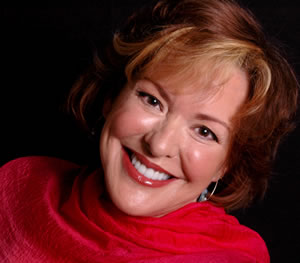
Jacquelyn Mitchard (Chicago, 10 december 1951)
De Amerikaanse dichter Thomas Lux werd geboren op 10 december 1946 in Northampton, Massachusetts. Zie ook mijn blog van 10 december 2008 en ook mijn blog van 10 december 2009.
Marine Snow At Mid-Depths And Down
As you descend, slowly, falling faster past
you this snow,
ghostly, some flakes bio-
luminescent (you plunge,
and this lit snow doesn’t land
at your feet but keeps falling below
you): single-cell-plant chains, shreds
of zooplankton’s mucus food traps,
fish fecal pellets, radioactive fallouts,
sand grains, pollen….And inside
these jagged falling islands
live more microlives,
which feed creatures
on the way down
and all the way down. And you,
in your sinking isolation
booth, you go down, too,
through this food-snow, these shards,
bits of planet, its flora
and flesh, you
slip straight down, unreeled,
until the bottom’s oozy silt, the sucking
baby-soft muck,
welcomes you
to the deep sea’s bed,
a million anvils per square inch
pressing on your skull.
How silent here, how much life,
few places deeper on earth,
none with more width.
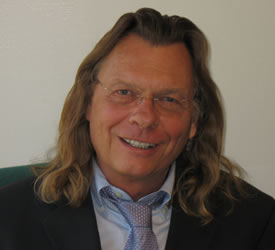
Thomas Lux (Northampton, 10 december 1946)
De Braziliaanse schrijfster Clarice Lispector werd geboren op 10 december 1925 in Podolia (Oekraïne). . Zie ook mijn blog van 10 december 2008 en ook mijn blog van 10 december 2009.
Uit: Family Ties (Vertaald door Giovanni Pontiero)
„He opened his sack and peered inside. Then he put his scrawny hand inside and slowly drew out the dead dog. His whole being was concentrated on that vital hand and he kept his eyes tightly shut as he pulled. When he opened them, the air was clearer still and the happy bells rang out again, summoning the faithful to the solace of punishment.
The unknown dog lay exposed.
He now set to work methodically. He grabbed the rigid black dog and laid it on a shallow piece of ground. But, as if he had already achieved a great deal, he put on his spectacles, sat down beside the dog’s carcass, and began to contemplate the landscape.
He saw quite clearly, and with a certain sense of futility, the deserted plain. But he accurately observed that when seated he could no longer see the minute city below. He sighed again. Rummaging in his sack, he drew out a spade and started thinking about the spot he would choose. Perhaps below the tree. He surprised himself, reflecting that he would bury this dog beneath the tree. But if it were the other, the real dog, he would bury it in fact where he himself would like to be buried were he dead: in the very center of the plateau, facing the sun with empty eyes. Then, since the unknown dog was, in fact, a substitute for the “other one,” he decided that the former, for the greater perfection of the act, should receive exactly the same treatment as the latter would have received. There was no confusion in the man’s mind. He understood himself with cold deliberation and without any loose threads.
Soon, in an excess of scruples, he was absorbed in trying to determine accurately the center of the plateau. It was not easy because the only tree rose on one side, and by accepting it as a false center, it divided the plain asymmetrically. Confronted with this difficulty, the man admitted, “It was unnecessary to bury in the center. I should also bury the other, let us say, right here, where I am standing at this very moment.”
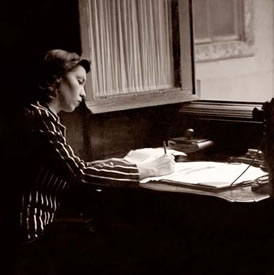
Clarice Lispector (10 december 1925 – 9 december 1977)
De Armeense schrijver Ara Baliozian werd geboren op 10 december 1936 in Athene. Zie ook mijn blog van 10 december 2006 en ook mijn blog van 10 december 2008 en ook mijn blog van 10 december 2009.
Uit: Pages From My Diary, 1986-1995 (1988)
„A reader writes: “In one of your articles dealing with wealth, you speak of pirates and merchants as if these two terms were interchangeable. As a businessman myself, I resent that very much. I think you owe all businessmen an apology.”
This businessman is right, trade is superior to piracy. But on this point, let me quote the words of an old wise man: “Trade is much superior to piracy. You can rob and kill a man but once, but you can cheat him again and again.”
It is a mistake to think of writers as members of an exclusive club – self-centered eccentrics overly fond of abstractions that have little or no bearing on reality and our daily existence. There are no fundamental differences between writers and ordinary human beings.
The most important difference between an ordinary human being and a writer is that a writer has discovered a way or developed a skill which allows him to transfer his inner world onto a piece of paper—that’s all.
To those who say: Since writers are no better than the rest of us, why should we bother with them? I say: To ignore a writer’s words would be as risky as ignoring or dismissing the advice of a physician, an electrician, a plumber, or for that matter, a garbage collector.
The earthquake may have been an act of God, but we, all of us, must bear some degree of responsibility for its tragic—and tragic to the point of being genocidal—dimensions.
When I speak of catastrophes I have in mind the kind that can be prevented. Man-made catastrophes as opposed to acts of God. Catastrophes can be easily foreseen if we decide to open our eyes and choose not to take refuge in prejudice, ignorance, and apathy.
Again and again I have heard Armenians say: “God must have something against us!” or, “We are not God’s Chosen People but Cursed People!” I say, we can no longer afford holding God responsible for all our misfortunes. We must learn to accept responsibility. Because earthquakes don’t kill people; buildings do.“
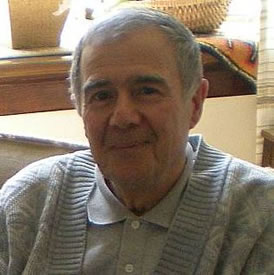
Ara Baliozian (Athene, 10 december 1936)
De Duitse schrijfster Christine Brückner werd geboren op 10 december 1921 in Schmillinghausen bij Bad Arolsen in Hessen. . Zie ook mijn blog van 10 december 2008 en ook mijn blog van 10 december 2009.
Uit: Wenn du geredet hättest, Desdemona
„Meine liebe Schwester und Kollegin, spielen Sie doch nicht immer mit Pedal! Eine Oktave tiefer, wenn ich bitten darf. Haben Sie das alles wirklich geglaubt? Kannten Sie keine Zweifel? Hatten Sie denn gar keinen Humor? Wo ist Ihnen das Lachen, die Selbstironie, vergangen? Bewundernd wiederholen Sie Goethes Forderung, dass der Mensch edel, hilfreich und gut sein solle. Sie bekannten sich dazu, eine Idealistin zu sein […] Ich zweifle – das müssen Sie mir glauben! – nicht an der Wahrhaftigkeit Ihrer Ideale! Sie selbst sind Ihrem Ziel sehr nahe gekommen […]
Würden Sie mir zustimmen, wenn ich behaupte: Nur die Ungerechtigkeit ermöglicht das Glück? Sie sind als Privilegierte geboren, Sie sind als Privilegierte gestorben. Auf Kosten anderer. Sie haben ein paar Schritte auf dem Weg der Emanzipation getan. Der Gedanke, die Frau zur völligen Freiheit der geistigen Entwicklung, zur ökonomischen Unabhängigkeit und zum Besitz aller bürgerlichen Rechte zu führen, ist weitgehend verwirklicht. Die Frau hat dasselbe Recht zur Entfaltung ihrer Möglichkeiten durch Unterricht und Studium wie der Mann, sie ist “vom Joch der Unwissenheit, des Aberglaubens, der Frivolität und der Mode” befreit. Oder doch nicht? Der Weg der Frau hat inzwischen eine andere Richtung genommen. Es geht uns heute mehr um allgemeine soziale Fragen, die Ziele sind kleiner geworden, sie gelten den Prüfungsergebnissen, der materiellen Versorgung im Alter, der Lohngleichheit, dem Schwangerschaftsabbruch. Die großen Ziele, die das eigene Ich, das Wir und die Vervollkommnung der Welt betrafen, haben wir dabei aus den Augen verloren.
Die Welt hat sich nicht in Ihrem Sinne verändert. Sie und Ihre Freunde strebten nach geistiger und seelischer Vollkommenheit. Heute strebt man nach vollkommenem Wohnkomfort, vollkommenen Kraftfahrzeugen, Badezimmern, Kinderzimmern, tadellosem Make-up. Was Sie am Ende Ihres langen Lebens befürchtet haben, ist eingetreten: Die materiellen Interessen haben die Macht über die Menschen gewonnen […]“
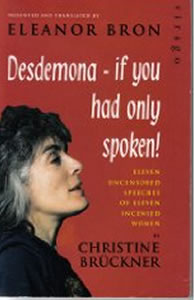
Christine Brückner (10 december 1921 – 21 december 1996)
Boekomslag Engelse vertaling
